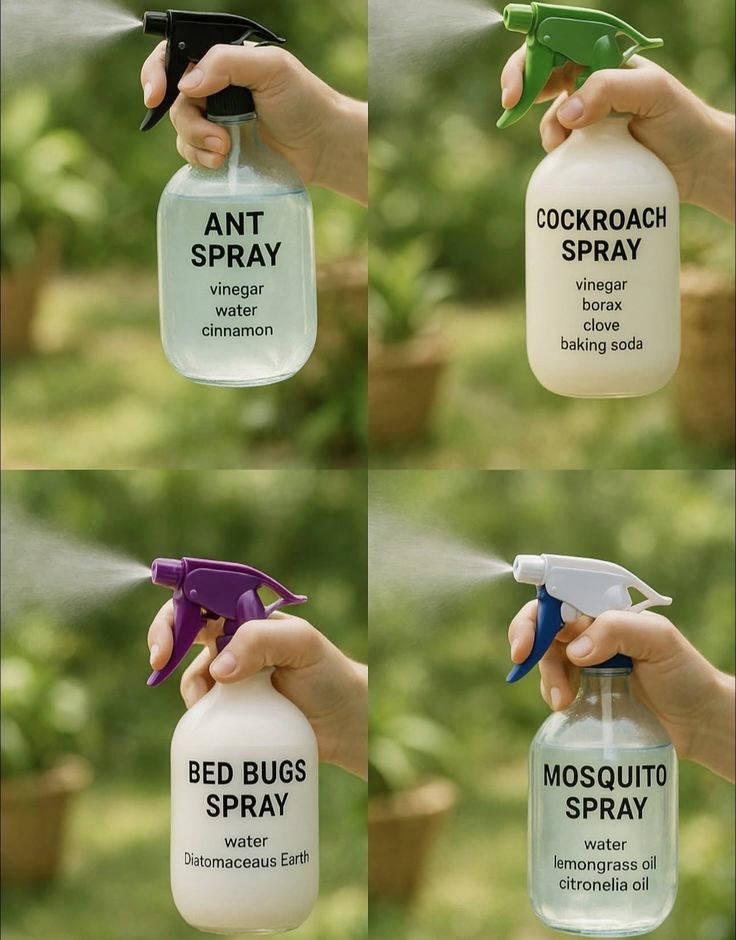Why Choose Homemade Bug Sprays?
Natural Ingredients: You know exactly what's going into your spray, avoiding harsh chemicals.
Cost-Effective: Many ingredients are common household items or inexpensive to purchase.
Customizable: You can adjust recipes to target specific pests or scents you prefer.
Safer for Pets and Children: When using essential oils, they are generally safer than chemical alternatives, but always use them diluted and with caution around very young children and pets.
General Tips Before You Start
Patch Test: Before spraying a large area, test a small, inconspicuous spot to ensure it doesn't stain or damage surfaces.
Shake Well: Essential oils can separate from water, so always shake your spray bottle well before each use.
Store in a Dark Place: Light can degrade essential oils, so store your homemade sprays in a dark cupboard.
Reapply Regularly: Natural sprays may need to be applied more frequently than chemical ones, especially after rain or heavy dew.
Recipe 1: All-Purpose Essential Oil Bug Spray
This versatile spray is excellent for a wide range of common household pests like ants, spiders, and general flying insects.
Ingredients:
10-15 drops Tea Tree Oil (natural antiseptic and insect repellent)
10-15 drops Peppermint Oil (repels spiders, ants, mosquitoes)
10-15 drops Lemon Eucalyptus Oil (effective mosquito repellent)
1 cup distilled water
1/4 cup witch hazel or rubbing alcohol (helps essential oils disperse)
Spray bottle
Instructions:
Combine witch hazel (or rubbing alcohol) and essential oils in the spray bottle.
Shake well to mix.
Add distilled water and shake again.
Usage: Spray around windows, doorways, baseboards, and any other areas where you've noticed pests. Avoid spraying directly on highly polished or delicate surfaces without testing first.
Recipe 2: Citronella Mosquito Repellent
Citronella is renowned for its mosquito-repelling properties. This spray is perfect for outdoor use or in areas where mosquitoes are prevalent.
Ingredients:
20-30 drops Citronella Essential Oil
10-15 drops Lemongrass Essential Oil (enhances mosquito repulsion)
1/2 cup distilled water
1/2 cup witch hazel or rubbing alcohol
Spray bottle
Instructions:
Mix witch hazel (or rubbing alcohol) and essential oils in the spray bottle.
Shake well.
Add distilled water and shake thoroughly.
Usage: Apply to skin before going outdoors (perform a patch test on skin first to ensure no irritation). You can also spray it on outdoor furniture, picnic blankets, or around your patio area.
Recipe 3: Vinegar-Based Ant and Roach Killer
White vinegar is a powerful, natural cleaner and a great deterrent for ants and roaches, which dislike its strong scent.
Ingredients:
1 cup white vinegar
1/2 cup water
10 drops Lemon Essential Oil (optional, for a fresher scent and added repellent power)
Spray bottle
Instructions:
Combine white vinegar and water in the spray bottle.
If using, add lemon essential oil and shake well.
Usage: Spray directly on ant trails, around entry points, or wherever you see roaches. The vinegar will kill ants and disrupt their scent trails. Wipe up dead insects and reapply as needed.
Recipe 4: Diatomaceous Earth (DE) Powder Application
While not a spray, food-grade diatomaceous earth is an incredibly effective natural pest control method, especially for crawling insects like ants, roaches, fleas, and bed bugs. It works by physically dehydrating insects.
Ingredients:
Food-grade Diatomaceous Earth
A dust applicator or an old spice shaker (for easy application)
Instructions:
Wear a mask to avoid inhaling the fine powder.
Carefully sprinkle a thin layer of DE in areas where pests are active: along baseboards, under sinks, behind appliances, in c
racks and crevices, and around pet bedding (for fleas).
